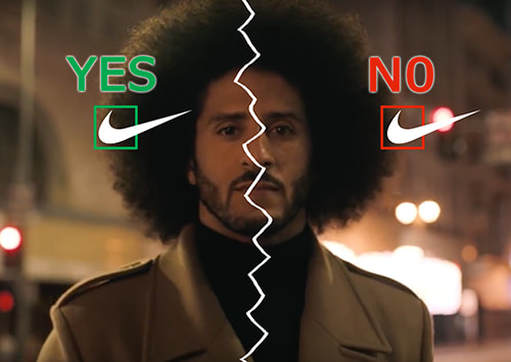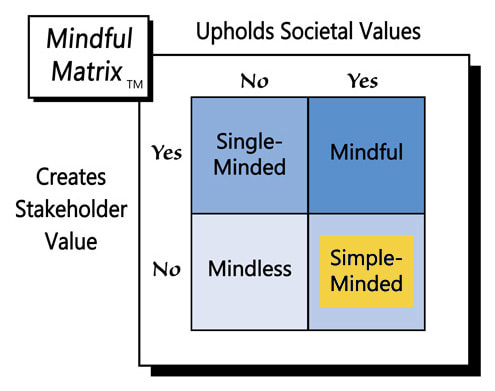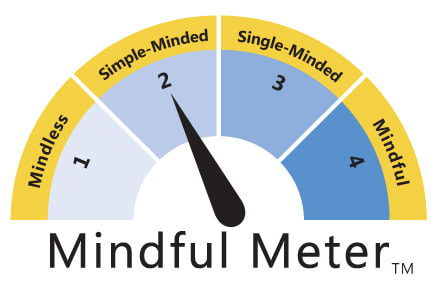Marking the 30th anniversary of the company’s iconic “Just Do It” campaign, Nike’s new ad uses narration from NFL-quarterback-turned-activist Colin Kaepernick, who also appears briefly in the spot to urge viewers to, among other things, “Believe in something, even if it means sacrificing everything.”
If you’re not familiar with Kaepernick, he was one of the first professional football players to choose to kneel during the national anthem as a sign of protest against what many believe has been growing racial injustice in America. The last game he played was in January of 2017, but Kaepernick has since become the face and voice of a movement that extends well beyond professional sports.
Of course, not everyone has appreciated Kaepernick’s activism. Some resent that his example has encouraged others to kneel during the national anthem, which they believe is either unfounded protest or a misplaced act that disrespects the flag and demonstrates a lack of patriotism. Anthem protests have since become a point of contention for many NFL fans, causing some to swear off the league entirely.
In short, whether right or wrong, Nike’s use of Kaepernick has struck a raw nerve in a nation deeply divided.
Before going further, I need to say that I really didn’t want to write about this ad. Maybe it’s my Swiss heritage that makes me lean toward neutrality and dislike discord, especially political. It’s not fun for me to tackle an ad that arouses such strong social division. However, after much debate and several stops and starts, I still felt compelled to address the ad and so decided to “just do it.”
The first step in this Mindful Marketing analysis is ethics: Does Nike’s ad uphold societal values? Given the sometimes-ambiguous nature of “societal values,” that question is inherently hard to answer, but the circumstances surrounding the Nike commercial make this inquiry especially difficult.
The ad’s ‘dream big’ theme is positive and hopeful and probably not something with which many people would take issue. Instead, the debate seems to fall squarely on the company’s use of Kaepernick and whether what he represents is decent, fair, honest, respectful, and responsible (the five core values Mindful Marketing seeks to uphold).
Unfortunately, for those like me trying to make a moral judgment, both sides can make a compelling case based on the same principles. People who oppose Kaepernick can argue, for instance, that his activism unfairly characterizes police officers who are honest and considerate of others. His opponents also may contend that the anthem protests dishonor members of the armed forces who risk their lives to protect the freedoms the flag represents.
On the other hand, those who support Kaepernick can claim that the social justice movement he signifies is fundamentally about showing everyone respect. Similarly, this side shares that its aim is to ensure the fair treatment of all people.
Admittedly, the issues are more complicated than what I am presenting here; however, the point is that both sides have strong countervailing points that are difficult to adjudicate. For sake of argument, therefore, let’s give the ad the benefit of the doubt and assume that it does support societal values.
The second question, then, considers the ad’s effectiveness, which is also very difficult to discern. After the ad was released online this past Monday, several of the first news reports were of anger. Some consumers vowed to boycott Nike products, while others took more immediate and drastic action by burning their Nike shoes and socks.
Newer reports, however, have been that after the ad was released, Nike’s sales “grew 31% from the Sunday of Labor Day weekend through Tuesday, as compared with a 17% gain recorded for the same period of 2017, according to San Francisco–based Edison Trends.”
On the other hand, Nike’s stock (NKE), which had closed at $82.18 a share on Friday, August 31, closed at $80.30 a share this past Friday, September 7.
So, does Nike really know what it’s doing with the Kaepernick ad? A recent Washington Post article makes a convincing case that Nike does. Columnist Sally Jenkins maintains that the commercial positions Nike well in national and global contexts that are increasingly multicultural. She also argues that young shoppers, who are especially important to sneaker makers, want to buy products from companies that support social causes.
Public opinion is not so clear. This past Friday morning, September 7, Apex Marketing Group reported that the ad had produced $220 million in publicity for Nike: $69 million positive, $67 million negative, and $83 million neutral. Apex also noted that the percentage of positive publicity had fallen by 9 percentage points from Thursday to Friday.
Some may argue that any publicity is good publicity. That assertion, however, seems to be a myth, especially after considering organizational examples like Volkswagen and individual ones like Harvey Weinstein.
Public favor for the ad also might wane as people take more time to process the financial context surrounding Nike’s and Kaepernick’s participation in the promotion. For a few years, Kaepernick was a very good NFL quarterback, who even played in a Super Bowl. Before he began his anthem protest, he had been demoted to backup status.
Kaepernick made a total of $43 million as an NFL quarterback, of which he has donated over $1 million to a variety of social justice causes. It’s difficult to know how much, if any, money he has made as an activist, but sports agents estimate that his new Nike endorsement could be worth “millions of dollars per year.”
For these reasons, some have taken issue with the ad’s suggestion that Kaepernick ‘sacrificed everything,’ especially when compared to individuals who have given their lives in service to their country.
Kaepernick may not be serving as a Nike spokesman for the money, but it’s hard to imagine that Nike’s choice of Kaepernick was without consideration of its bottom-line, given that it’s a for-profit company that must answer to shareholders in an increasingly competitive marketplace. Not surprising, some have accused the company of “commercializing activism,” i.e., profiting from a social cause.
Another concern for Nike should be its relationship with the NFL. This past March, the NFL announced that Nike would continue to be its official supplier of uniforms and sideline gear through 2028. It’s not known how much these rights cost Nike, but it’s likely the company paid more than the $1.1 billion it reportedly invested for similar exclusivity in 2012.
The anthem protests that Kaepernick initiated continue to be a thorn in the side of the NFL. What’s more, Kaepernick has sued the NFL, claiming that the league has colluded to keep him off the field since he last played. All this to say, there are probably few people the NFL would rather not see exalted in a commercial than Kaepernick. Talk about biting the hand that feeds you.
Nevertheless, the league has tried to put on a good face about the ad. NFL executive vice president of communications and public affairs Jocelyn Moore offered the following:
“The National Football League believes in dialogue, understanding and unity. We embrace the role and responsibility of everyone involved with this game to promote meaningful, positive change in our communities.” “The social justice issues that Colin and other professional athletes have raised deserve our attention and action.”
Despite Moore’s conciliatory tone, one has to imagine that the ad places a significant strain on the relationship between the league and Nike that will only be exacerbated if there are further defections of NFL fans. Although her response makes it seem unlikely that the NFL is considering the commercial to be any kind of contractual breach, the ad will at a minimum cause the league to think more carefully about Nike and future sponsorships.
Like the ethical analysis, assessment of the commercial’s likely effectiveness has also been complicated. In the short-term, people may continue to applaud Nike for its social conscience. The ad and Kaepernick’s lawsuit, however, must be straining its relationship with the NFL.
Moreover, the ad’s theme of “sacrificing everything,” coming from a multimillionaire and a Fortune 100 company, will increasingly ring hollow with people, especially those working two jobs to make ends meet, or mourning loved ones who truly sacrificed everything in service to their country or community.
Credible cases can be made for placing Nike’s Kaepernick commercial in any one of the four Mindful Marketing quadrants, particularly given the ad’s multifaceted social implications. The ad’s effectiveness is also debatable. However, given the strained relationship with the NFL and a likely increase in public disaffect, there’s good reason for calling the commercial “Simple-Minded Marketing.”
Learn more about the Mindful Matrix and Mindful Meter.
Check out Mindful Marketing Ads and Vote your Mind!




 RSS Feed
RSS Feed